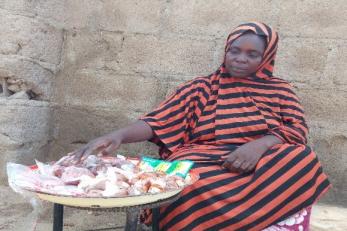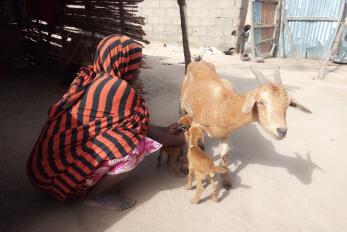Enabling conflict-affected households to recover and meet nutrition needs

In the Northeast of Nigeria, over 2.7 million people are internally displaced and grappling with inadequate shelter, food insecurity and poverty. Mercy Corps’ Nigeria is providing life-saving assistance to over 94,000 individuals in Damboa, a conflicted-afflicted local government area, in Borno state of Northeast Nigeria.
Kellu Mohammed and her family were farmers in their hometown, Damboa village in Borno state but when the crisis struck they were forced to flee to Maiduguri and leave everything they owned behind due to the violence from the Armed Opposition Groups (AOGs) intensifying. While being displaced, Kellu and her family experienced intense hardship and were living in sordid conditions.
Eventually, when the violence had subsided Kellu was able to return to Damboa with her family, but with nothing to their name. “We made a living by relying on family and friends who we begged from to eat and survive,” Kellu painfully recalls.
In 2019, Kellu began receiving monthly dry food baskets as a participant under the Mercy Corps’ Responsive Economic Assistance to Conflict-Affected Households (REACH), a food security and nutrition program, since then her and her family’s lives have changed for the better.
In addition to a monthly dry food basket, she also attended regular Mother to Mother Support Group meetings in her community to learn about infant and young child feeding with other mothers in a safe and inclusive way. Kellu was able to learn about the benefits of exclusive breastfeeding while a child is below 6 months, how to introduce other foods once a child is over 6 months and how to use the Mid-Upper Arm Circumference (MUAC) tapes to detect malnutrition in children under age 5.
In a bid to ensure mothers like Kellu are consuming an adequate and nutritious diet, the REACH program provides training on components of a balanced diet and cooking demonstrations of meals that can be made with the dry food baskets.
As a holistic program, Mercy Corps’ nutrition and food security efforts complement each other to create new opportunities for participants. Thanks to the food security offered by REACH’s monthly dry food vouchers, Kellu was able to leverage her limited funds to start a petty trading business. She now sells daily necessities such as pepper, onions, salt, and charcoal in her neighborhood to support her family.
With the profit generated from her petty trading business, Kellu joined a women’s savings group where she contributes 500 NGN on a weekly basis. After three weeks of going through the savings cycle, Kellu was able to purchase a female goat which she uses for rearing and sells the goat’s male offspring.
During the Mother to Mother support group meetings, Kellu’s enthusiasm and extensive experience in infant and young child feeding shone through that she was selected as a lead mother for a support group in her community. Having 9 children of her own, Kellu is an ideal role model for new mothers and is happy to have a platform to share her experiences and knowledge with other mothers in her community.
As a budding entrepreneur and rising leader in her community, Kellu hopes to be selected for the REACH program’s kitchen gardening and poultry production complementary nutrition activities. Despite the uncertainty and worries brought on by COVID‑19 and restrictions on public gatherings, Kellu is still optimistic about the future.
“I hope to be able to provide more nutritious meals for my family with the poultry from Mercy Corps and be able to sell all extra eggs from the birds in Damboa.”
During this pandemic, REACH is still providing monthly dry food and fresh food baskets as well as Infant and Young Child Feeding promotion and counseling to families who have lost everything at the hands of conflict. As households stabilize and search for new opportunities for growth, REACH 4 is starting up kitchen gardening and poultry production to improve nutrition outcomes. These activities will not only provide more opportunities for greater self-reliance and economic growth but will also ensure that participants have regular access to vegetables and sources of animal protein for their daily meals.

About REACH
Responsive Economic Assistance to Conflict-Affected Households (REACH 4) is a food security and nutrition program funded by the United States Agency for International Development Office for Food For Peace (USAID FFP) and is in its fourth iteration.
REACH 4 aims to support 13,512 vulnerable households consisting of over 94,000 individuals in Damboa, Borno state. The program provides benefits ranging from dry food vouchers and complementary nutrition activities (screening for malnutrition and distribution of vouchers for fresh vegetables, fruits, meat, fish and eggs) to ensure that conflict-affected households consume an adequate and nutritious diet. REACH 4 aims to build the resilience of these households by investing in their food security and nutrition.